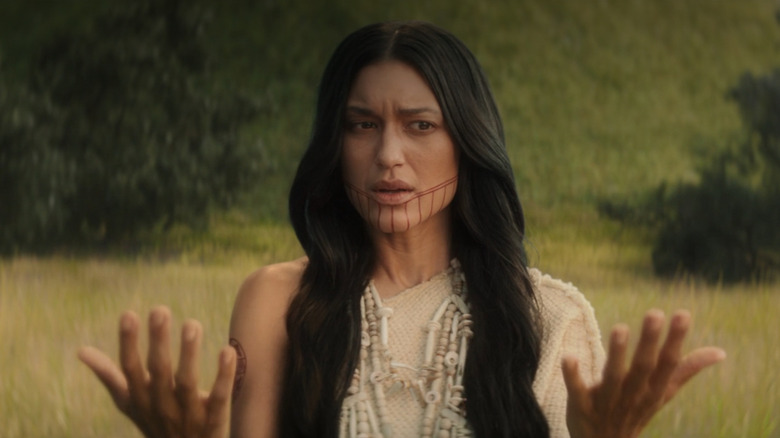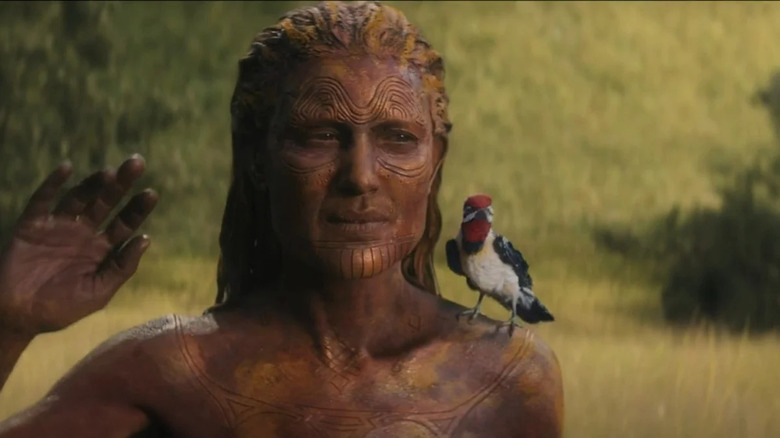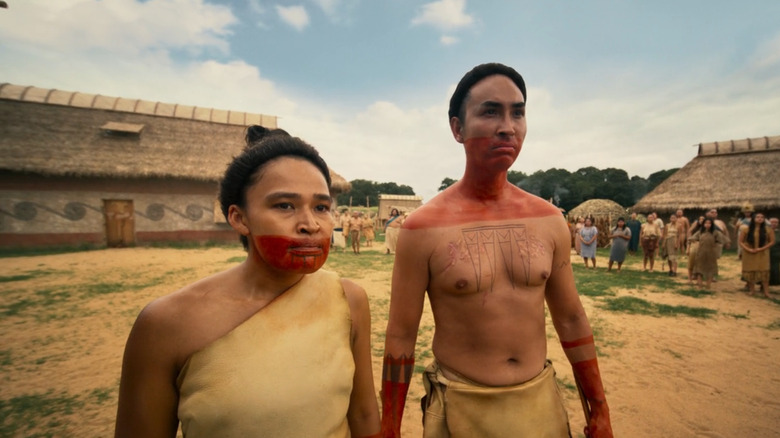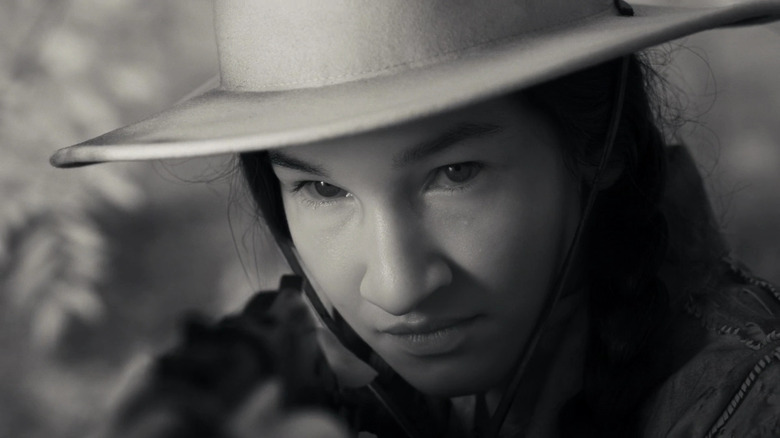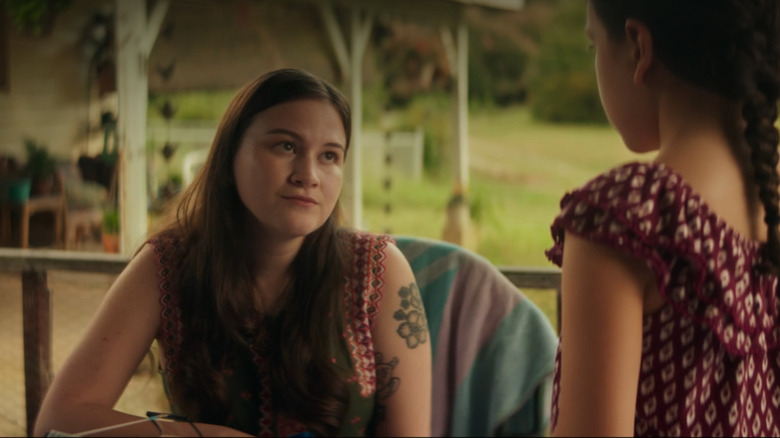Who Are Chafa, Lowak, And Tuklo In Marvel's Echo? The Indigenous Ancestors Explained
The following contains spoilers for the Marvel Studios series "Echo."
The latest entry in the Marvel Cinematic Universe is something kind of unique, following the villain-to-antihero origin story of Maya Lopez, A.K.A. Echo (Alaqua Cox). It's the first TV-MA-rated show released under the "Marvel Spotlight" banner and it gets a little more experimental in its storytelling, beginning each episode with a flashback to one of Maya's ancestors awakening some great power within themselves. Each of these ancestors then helps Maya by passing their powers on to her, allowing her to access their agility, accuracy with ranged weapons, and even magical healing abilities. She is an echo of them, carrying the powers and responsibility to protect her people, which helps her to heal from her turbulent, crime-ridden past.
But who are each of these ancestors? The episodes only show brief glimpses of their story, but there's some historical context that can provide more information and help us understand how each represents the strength within both Echo and the Choctaw Nation. Let's take a look at each of the ancestors and how they relate to history and the latest MCU show!
Chafa, the first Choctaw
The first of Maya's ancestors that we're introduced to is Chafa, the first Choctaw. In the origin myth told in the series, Chafa (Julia Jones) was part of an ancient group of proto-humans who lived in a cave deep within the Earth. When danger came to the cave, Chafa helped save her family and brought them up topside, where they became the first Choctaw people. Because Maya can directly trace her lineage to Chafa, she carries the powers of the ancient people within her as well, represented by glowing spirals that appear on her hands.
There are a couple of different recorded Choctaw creation myths, though nothing readily available in English references a Chafa. She is likely based on the Chahta creation myth, in which the Chahta (Choctaw) people came out of a hill called Nanih Waiya (the Mother Mound), where they were formed by the creator god out of clay. The creators of "Echo" worked closely with the Choctaw Nation and had consultants around to help ensure respect for the people and their culture, making the show feel authentic even in its more fictionalized elements. Chafa is the fount of her family's powers, going all the way down to Maya.
Lowak, a fierce competitor
The second ancient ancestor of Maya's that we're introduced to is Lowak (Morningstar Angeline), a fierce competitor in North America's oldest sport: Ishtaboli, or stickball. The game bears similarities to lacrosse, though it was taken much more seriously. Another name for stickball is kapucha toli, which translates loosely to "little brother of war," because the game was often used to solve disputes instead of having open warfare, as we see in the second episode of "Echo." Lowak is engaged in a game against a neighboring group, and whoever loses will be banished from the region. Honestly, using sports to solve land disputes is a pretty fantastic idea that would save countless lives, and in Lowak's case, she also manages to win for her people and secure their homes.
Lowak appears to have incredible agility and strength that can be enhanced by her connection to her ancestors, as we see her channeling them right before she uses her stick to get the ball, then flips her whole body over her competitors to score the winning point. It's really impressive, and she passes these skills down to Maya, who uses them to help her fight off Kingpin's goons.
Tuklo, a protector of life
The third ancestor of Maya's that we meet is Tuklo (Dannie McCallum), a young Choctaw woman who joins her father, a Lighthorseman, to take down criminals in the early 1800s. The Lighthorsemen were the tribal police forces of five Indigenous tribes: the Cherokee, Chickasaw, Choctaw, Creek, and Seminole. They were given jurisdiction over Indigenous people in their lands, though they were expected to leave non-Choctaw criminals alone to face the wrath of the U.S. government. Many tribal police forces today still call themselves Lighthorsemen, including the Choctaw in Oklahoma. (Technically, they are now Lighthorse, which is more gender-equal.)
Tuklo is incredible with all kinds of ranged weapons, including throwing knives and rifles, and she passes this down to Maya through her heritage. When she channels her ancestors, she seems to have supernatural sight, allowing her to see at incredible distances so she can be more accurate with her weapons. She also shares a fascinating line about how she doesn't want to create life unless she can protect it, something the mothers throughout Maya's line seem to understand very well.
Taloa, the healer
The final ancestor that passes on a power to Maya is her own mother, Taloa (Katarina Ziervogel). She was a gifted healer, and we see her help save a bird that Maya wounded with her slingshot, channeling her ancestral power to fix its wounds. She explains to Maya that woodpeckers are sacred and that they help spread messages when the Choctaw people are in trouble, which later helps Maya realize that her family is in danger when a woodpecker taps on a parking sign. Sadly, Taloa dies in a car accident when Maya is young, causing a rift in the family that lasts for 20 years, but they are given one final reunion when Taloa's spirit visits Maya and helps her understand her place in the family and the world.
Maya ends up able to channel the skills and supernatural powers of her ancestors, just as she is also able to draw on the stories she knows of them, and in the case of her mother, her love. It's an incredible gift, to be sure, and one that makes her not just an incredible Deaf amputee superhero, but an authentically Indigenous one too.
All five episodes of "Echo" are currently streaming on Disney+ and Hulu.
